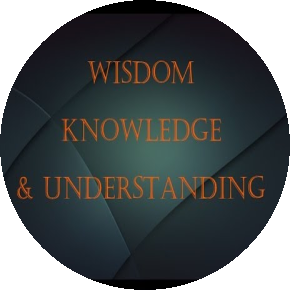Confirmation-The Seven Fold Grace of God pt 1: Wisdom, Knowledge, Understanding

In the Catechism of the Council of Trent we read:
Quote “In Confirmation is contained the true and proper nature of a Sacrament has always been acknowledged by the Catholic Church.” the Catechism goes on to say, “The truth of this doctrine St. Clement could not confirm in stronger terms than when he says, 'All should hasten without delay to be born again (baptized) unto God, and afterwards to be signed (confirmed) by the Bishop.” that is to receive the seven fold grace of the Holy Ghost; for, as has been handed down to us from St. Peter, and as the other Apostles taught in obedience to the command of Our Lord, he who culpably and voluntarily, and not from necessity, neglects to receive this Sacrament, cannot possibly be a perfect Christian.' To be a perfect and complete Christian one needs to be sealed at the day of their confirmation with the seven fold grace of the Holy Ghost.”
What is the seven fold grace of the Holy Ghost? And what are they used for in our Christian life?
The seven fold grace of the Holy Spirit that, initially, are magnified in us at our confirmation and are unique skills and abilities given by the Holy Spirit to faithful followers of Christ to serve God for the common benefit of his people, the Church. And for reaching others, out side of the Church, for Christ. The seven fold grace, referred to by the Catechism, is described in Isaiah 11:1-3, where it mentions wisdom, understanding, counsel, fortitude, knowledge, and Piety and the fear of the Lord. The seven fold grace of the Spirit, mentioned in Isaiah, are simply God empowering faithful Christians to do what He has called us to do. The Catholic Church list them as:
-
Wisdom
-
Understanding
-
Counsel
-
Fortitude
-
Knowledge
-
Piety -Godliness
-
Fear of the Lord
Now Concerning Wisdom, knowledge and Understanding? And what is the differences between the three?
Wisdom and knowledge and understanding, are recurring themes in the Bible, and are related but not synonymous. As far as Widsom and Knowlege is concerned, the dictionary defines wisdom as “The right use or exercise of knowledge; the ability to discern or judge what is true, right, or lasting” Knowledge, on the other hand, is “information gained through experience, reasoning, or acquaintance.” Knowledge can exist without wisdom, but wisdom can not exist without knowledge. One can be knowledgeable without being wise. Knowledge is knowing how to use a gun; wisdom is knowing when to use it and when to keep it holstered.
God wants us to have knowledge of Him and what He expects of us. In order to obey Him, we have to have knowledge of His commandments. But as equally important as having knowledge is having wisdom. Knowing facts about God and the Bible is not all there is to wisdom. Wisdom is a gift from God. James 1:5 states, “But if any of you want wisdom, let him ask of God, who giveth to all men abundantly, and upbraideth not; and it shall be given him.” God blesses us with wisdom in order for us to glorify Him and use the knowledge we have of Him.
The book of Proverbs is perhaps the best place in the Bible to learn of biblical wisdom. Proverbs 1:7 speaks of both biblical knowledge and wisdom: “The fear of the Lord is the beginning of knowledge. Fools despise wisdom and instruction. ” To fear the Lord is to start on the path to knowledge, and God can then begin to provide us with wisdom through Christ, who the Bible says is wisdom itself: “But of him are you in Christ Jesus, who of God is made unto us wisdom, and justice, and sanctification, and redemption: ” (1 Corinthians 1:30).
Knowledge is what is gathered over time through study of the Scriptures. It can be said that wisdom, in turn, acts properly upon that knowledge. Wisdom is the fitting application of knowledge. Knowledge understands the light has turned red; wisdom applies the brakes. Knowledge sees the quicksand; wisdom walks around it. Knowledge memorizes the Ten Commandments; wisdom obeys them. Knowledge learns of God; wisdom loves Him.
At first glance, it seems that the authors of the Bible use the words “wisdom,” “knowledge,” and a third term, “understanding,” almost interchangeably. A closer examination shows a difference in the way the three terms are used. This difference is very important for our understanding of this third mental model of “wisdom and knowledge.”
Simply put, these gifts as they are called in the Bible are defined as:
-
Knowledge – the facts.
-
Understanding – ability to translate meaning from the facts .
-
Wisdom – knowing what to do next, given an understanding of the facts and circumstances.
Those with knowledge are able to collect, remember, and access information. But, it is possible to have knowledge and lack understanding and wisdom. Someone might have the facts, but not know what they mean or what to do next.
Those with understanding are able to extract the meaning out of information. They “see through” the facts to the dynamics of what, how, and why. Understanding is a lens which brings the facts into crisp focus and produces principles.
Those with wisdom know which principle to apply in a given context. Understanding without wisdom can appear contradictory. For example, the statement, “He who hesitates is lost,” is true, but so is the idea that “haste makes waste.” Which principle to use depends on the context. Those with wisdom know what actions to take next. They do the right thing in the given situation. In contrast, there are many who have great knowledge and understanding but who consistently do the wrong thing.
It has been said,
Wisdom is the right use of knowledge. To know is not to be wise. Many men know a great deal, and are all the greater fools for it. There is no fool so great a fool as a knowing fool. But to know how to use knowledge is to have wisdom.
In any given situation, God rarely gives all three gifts to any one person. We need to cooperate and assist each other with our particular gift in order to accomplish what God has called us to do, especially in our vocational work.
This is what economists call the “knowledge problem.” No one person or group can have absolute knowledge or know all the facts, though we are all supposed to work towards developing and acquiring knowledge, wisdom, and understanding in our lives. God is the only one who does not have a knowledge problem.
Let’s look closer at this idea of knowledge.
The New Testament word “disciple” literally means “a learner.” Christians are called to a careful study of the Bible. This will help us acquire the knowledge that we need in order to do what God has called us to do. Jesus said,
If you continue in my word, you shall be my disciples indeed. And you shall know the truth, and the truth shall make you free. (John 8:31–32).
One author wrote in his daily devotional that,
Our Lord calls for a continued application of the mind to His Word. A disciple does not dabble in learning. He makes the pursuit of an understanding of God’s Word a chief business of his life.








 Follow
Follow

